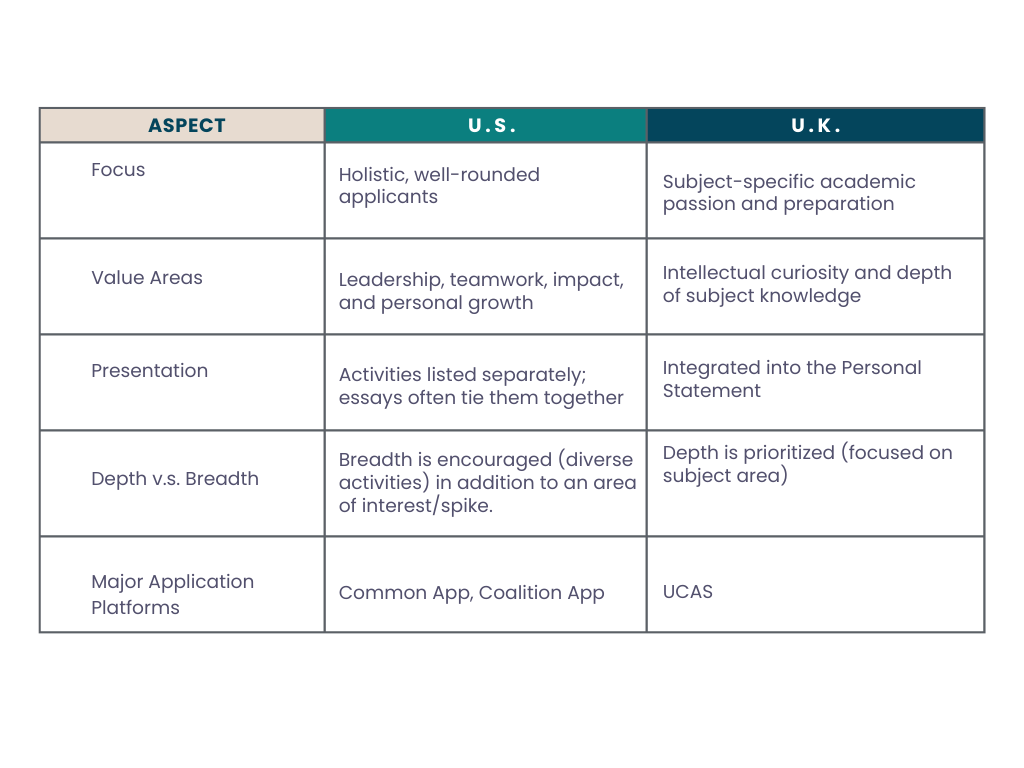USA vs. UK Extracurricular Activities Supra-curricular Activities
When preparing college or university applications for both the U.S. and the U.K., understanding the key differences for significance of activities outside the classroom can make the difference between being an average applicant and a competitive one.
U.S. and U.K. institutions, value these activities somewhat differently. While U.S. colleges focus more on extracurricular activities, U.K. universities focus more on what are known as supra-curricular activities/super-curricular activities.
If you, or your child is applying apply to the U.S., the U.K., or both, it is important to understand these concepts and their roles in admissions.
What Are Extracurricular Activities?
Extracurricular activities are pursuits that students engage in outside their academic coursework. U.S. colleges in particular encourage these activities because they believe they shape well-rounded individuals.
Examples of Extracurricular Activities
Sports Teams (e.g., soccer, basketball, tennis)
Performing Arts (e.g., choir, theater, dance)
Leadership Roles (e.g., student government, club president)
Volunteering and Community Service
Creative Pursuits (e.g., photography, creative writing, painting)
Why U.S. Colleges Value Extracurricular Activities
U.S. colleges take a holistic approach to admissions, wanting to know who you are beyond your grades. These activities showcase skills such as leadership, teamwork, time management, and a commitment to positively impacting your community. So, although creating a spike is important for U.S. applications, demonstrating strong involvement, awards, and progression (e.g., moving from a club member to president) can highlight qualities that make a student stand out in competitive applicant pools.
How Extracurricular Activities Are Presented on Applications
Most U.S. colleges use platforms like the Common App, where students list their activities in an "Activities Section." This includes:
The role and organization name
Achievements/impact (e.g., increased club membership by 20%)
Time commitment (e.g., 5 hours/week)
Leadership positions or key contributions
Additionally, essays such as the individual college supplements give students a chance to explore how their extracurriculars reflect their values and ambitions.
What Are Supra-curricular Activities?
The word supra comes from Latin for “above, beyond, or outside.” However, you will also see the term written as super-curricular.
In comparison to the U.S., the U.K. focuses more heavily on a student's academic preparation and interests relevant to their chosen course of study. Supra-curricular activities are directly tied to the subject a student wishes to pursue at university.
Examples of Supra-curricular Activities
Subject-Specific Reading (e.g., books, academic journals)
Competitions and Olympiads (e.g., math competitions, science fairs)
Relevant Work or Research Experience
Lectures, Seminars, or Online Courses (e.g., MOOCs like Coursera or edX)
Independent Projects related to your academic focus (e.g., writing a history research paper or conducting lab experiments)
Why U.K. Universities Value Supra-curricular Activities
U.K. universities, especially ones like Oxford, Cambridge, and Russell Group universities, primarily assess a student’s aptitude and passion for a specific subject area. Supra-curricular/super-curricular activities demonstrate:
Intellectual curiosity and the ability to explore beyond the classroom
Genuine motivation to pursue a particular subject
Evidence of initiative through independent learning
For example, if you're applying to study engineering, highlighting participation in robotics competitions, completing online coding courses, or shadowing a professional engineer would be highly relevant.
How Supra-curricular Activities Are Presented on Applications
Unlike the U.S., U.K. applicants use UCAS, which consolidates their application and includes a single Personal Statement. The Personal Statement is critical and should:
Reflect why a student is passionate about the subject they are applying to
Highlight relevant supra-curricular experiences
Demonstrate skills essential for university success (e.g., analytical thinking, problem-solving)
Admissions tutors seek evidence of "depth" in the chosen field more than breadth. This is why a student applying to history wouldn't need to mention their volunteer work unless it directly connects to their academic interests (e.g., working in a museum archive).
Key Differences
Tips for Students Applying to Both Systems
For students planning to apply to both U.S. and U.K. institutions, striking the right balance is essential.
Identify Core Interests Early
Reflect on your interests and consider their relevance to both systems. For example, an interest in science might translate to conducting lab work and joining STEM clubs or science fairs, which is useful when applying to both the U.S. and the U.K.
Activities can serve dual purposes
For instance:
Writing an essay for a historical journal aligns with U.K. supra-curricular expectations while also showing intellectual initiative for U.S. colleges.
Volunteering as a tutor showcases service for U.S. applications but can also reflect your passion for education in a U.K. context.
Tailor Applications Strategically
Be mindful of how you frame your experiences. While the U.S. values a well-rounded narrative, the U.K. prefers focused, subject-specific preparation. Adjust descriptions and essays accordingly.
Use Recommendations Wisely
If possible, request recommendation letters that align with each system's values. For U.S. universities, in addition to teacher references, you can often included other references highlighting leadership and character.
For the U.K., choose referees who can speak to your academic abilities.
Wrapping Up
Understanding the difference between extracurricular activities (U.S.) and supra-curricular activities (U.K.) is crucial for presenting yourself as a compelling, competitive applicant. Whether you’re listing your accomplishments on the Common App or crafting a focused UCAS Personal Statement, tailoring your activities to meet each system’s expectations is the key to success.
Are you ready to make the most of your application process? Feel free to contact me to find out how I can help to support your academic aspirations!

